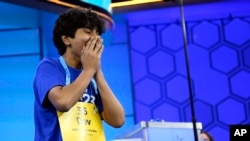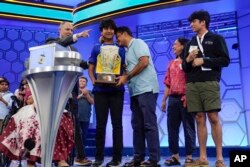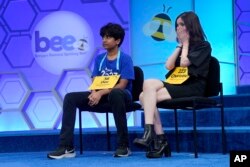Fifteen months ago, Dev Shah spent a miserable five hours spelling outdoors in chilly, windy, damp conditions at a supersize regional competition in Orlando, Florida, only to fall short of his dream of returning to the Scripps National Spelling Bee.
"Despondent is the right word," Dev said. "I just didn't know if I wanted to keep continuing."
Look at him now.
Soft-spoken but brimming with confidence, Dev asked precise questions about obscure Greek roots, rushed through his second-to-last word and rolled to the National Spelling Bee title Thursday night.
Dev, a 14-year-old from Largo, Florida, in the Tampa Bay area, first competed at the national bee in 2019, then had his spelling career interrupted. The 2020 bee was canceled because of COVID-19, and in the mostly virtual 2021 bee, he didn't make it to the in-person finals, held in his home state on ESPN's campus at Walt Disney World.
Then came the disaster of last year, when he was forced to compete in the Orlando region because his previous regional sponsor didn't come back after the pandemic.
"It took me four months to get him back on track because he was quite a bit disturbed and he didn't want to do it," said Dev's mother, Nilam Shah.
When he decided to try again, he added an exercise routine to help sharpen his focus and lost about 15 pounds, she said.
Dev got through his region. He flexed his knowledge in Wednesday's early rounds by asking questions that proved he knew every relevant detail the bee's pronouncers and judges had on their computer screens. And when it was all over, he held the trophy over his head as confetti fell.
"He appreciated that this is a journey, which sounds very trite but is really quite true," said Dev's coach, Scott Remer, a former speller and study guide author. "I think the thing that distinguishes the very best spellers from the ones that end up not really leaving their mark is actually just grit."
Dev's winning word was "psammophile," a layup for a speller of his caliber.
"Psammo meaning sand, Greek?" he asked. "Phile, meaning love, Greek?"
Dev soaked up the moment by asking for the word to be used in a sentence, something he described a day earlier as a stalling tactic. Then he put his hands over his face as he was declared the winner.
"I would say I was confident on the outside but inside I was nervous, especially for my winning word — well, like, before. Not during," he said.
Runner-up Charlotte Walsh gave Dev a congratulatory hug.
"I'm so happy for him," said Charlotte, a 14-year-old from Arlington, Virginia. "I've known Dev for many years and I know how much work he's put into this and I'm so, so glad he won."
The winner's haul is more than $50,000 in cash and prizes. When Charlotte returned to the stage later to congratulate Dev again, he reminded her that the runner-up gets $25,000.
"Twenty-five thousand! What? I didn't know that," Charlotte said.
Earlier, when the bee was down to Dev and Charlotte, Scripps brought out the buzzer used for its "spell-off" tiebreaker, and Dev was momentarily confused when he stepped to the microphone.
"This is not the spell-off, right?" Dev asked. Told it was not, he spelled "bathypitotmeter" so quickly that it might as well have been.
"I practiced for the spell-off every day, I guess. I knew it might happen and I prepared for everything, so I kind of went into spell-off mode," he said. "But I also was scared for the spell-off."
Dev is the 22nd champion in the past 24 years with South Asian heritage. His father, Deval, a software engineer, immigrated to the United States from India 29 years ago to get his master's degree in electrical engineering. Dev's older brother, Neil, is a rising junior at Yale.
Deval said his son showed an incredible recall with words starting at age 3, and Dev spent many years in participating in academic competitions staged by the North South Foundation, a nonprofit that provides scholarships to children in India.
The bee began in 1925 and is open to students through the eighth grade. There were 229 kids onstage as it began — and each was a champion many times over, considering that 11 million participated at the school level.
The finalists demonstrated an impressive depth of knowledge as they worked their way through a sometimes diabolical word list chosen by Scripps' 21-person word panel, which includes five past champions.
This year's bee proved that the competition can remain entertaining while delving more deeply into the dictionary — especially early in the finals, when Scripps peppered contestants with short but tough words like "traik" (to fall ill, used in Scotland), "carey" (a small to medium-size sea turtle) and "katuka" (a venomous snake of southeastern Asia).
"There are a lot of hard words in the dictionary," Dev said. "There are realms of the dictionary that the word panelists need to dive into and I think they did a great job of that today."
With the field down to four, Shradha Rachamreddy was eliminated on "orle," a heraldry term that means a number of small charges arranged to form a border within the edge of a field (she went with "orel"). And "kelep" — a Central American stinging ant — ousted Surya Kapu (he said "quelep").
While sometimes Scripps' use of trademarks and geographical names can anger spelling traditionalists who want to see kids demonstrate their mastery of roots and language patterns — and even the exceptions to those patterns — Scripps has made clear that with the exception of words designated as archaic or obsolete, any entry in Merriam-Webster's Unabridged dictionary is fair game.
Dev is happy to be closing that book for now.
"My main priority is sleep. I need to sleep. There have been a lot of sleepless nights these last six months," he said. "I need to sleep well tonight, too. There's a lot more sleep debt."






